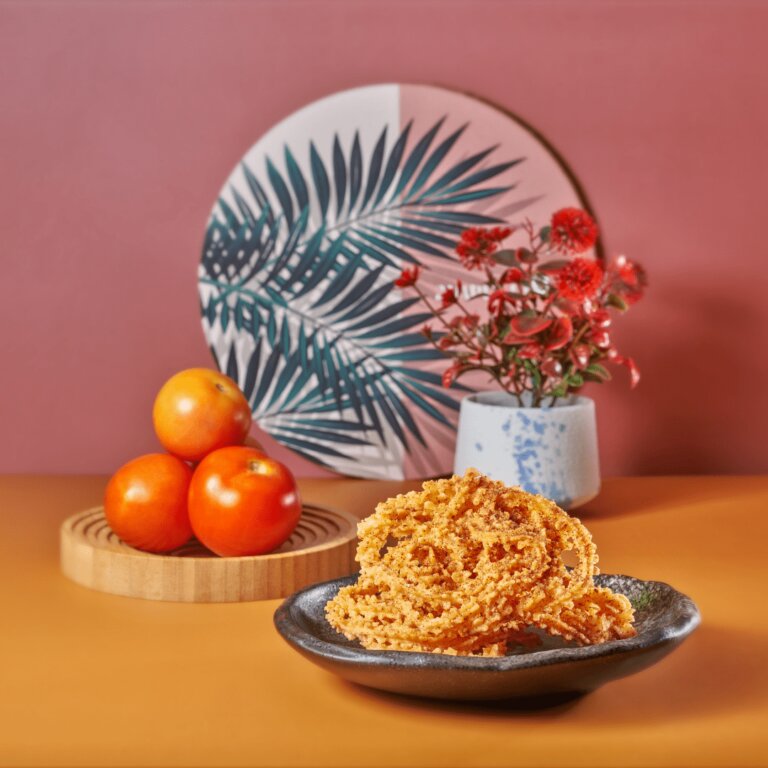Deepavali, also known as the Festival of Lights, is a time for joyous celebrations, family gatherings, and of course, delicious festive treats.
Among the many snacks prepared for this occasion, one that holds a special place is muruku.
This crunchy, spiral-shaped savoury snack has been a staple of Deepavali celebrations for generations, offering a taste of tradition that’s as rich in history as it is in flavour.
The Origins of Muruku
Muruku, also spelled murukku, traces its origins to South India, where it has been enjoyed for centuries.
The word “muruku” itself comes from the Tamil word for “twisted,” referring to the snack’s distinctive spiral or twisted shape.
Traditionally, muruku is made from a mixture of rice flour and urad dal (black gram) flour, seasoned with spices such as cumin, sesame seeds, and sometimes ajwain (carom seeds), giving it its signature savoury taste.
The process of making muruku has been passed down through generations.
While modern conveniences like muruku presses are commonly used today, in earlier times, the dough was often hand-shaped and carefully fried in oil, a labour of love that brought families together.
Muruku’s Role in Deepavali Celebrations
Deepavali is a celebration that symbolises the victory of light over darkness and good over evil.
Like many cultural festivals, food plays a central role in the festivities, and muruku is an essential part of the spread.
In Indian households, the preparation of muruku often begins days before the festival.
Family members, especially the elders, come together to prepare large batches, sharing stories, laughter, and the excitement of the festival.
The making of muruku symbolises the act of sharing and generosity, key themes in Deepavali celebrations.
The Cultural Significance of Muruku
Muruku holds cultural significance beyond its status as a festive treat.
In many ways, its preparation represents the values of patience, unity, and heritage.
The act of handcrafting each piece of muruku connects the present generation with the customs and practices of their ancestors, ensuring that the knowledge and techniques continue to live on.
Moreover, muruku is often distributed to neighbours, friends, and relatives during Deepavali, as part of the tradition of sharing food and goodwill.
Offering muruku to guests during the festival is seen as a sign of hospitality and the spirit of celebration.
Muruku’s Evolution Over Time
While the traditional muruku recipe remains a firm favourite, modern variations have emerged over time, catering to changing tastes and dietary preferences.
Today, you can find muruku in different flavours and textures, from Salted Egg muruku to Tom Yum and even Tomato-flavoured versions.
There are even healthier options available, such as baked muruku, for those looking to enjoy the snack without the deep-frying.
Despite these innovations, the essence of muruku remains unchanged.
It continues to be a beloved festive snack, evoking memories of home, family, and cultural pride.
Conclusion
Muruku is more than just a savoury snack; it is a symbol of tradition, family, and the joy of sharing.
Its historical roots in South Indian culture, combined with its integral role in Deepavali celebrations, make it a cherished part of the festival.
Whether you’re making it from scratch or picking up a batch from your favourite bakery, enjoying muruku during Deepavali is a way to connect with both your cultural heritage and the festive spirit of the season.
For an exceptional corporate gift or bulk order for your office Deepavali celebration, choose Mdm Ling Bakery’s curated gift boxes and premium snacks, including our delectable muruku.
Explore Mdm Ling Bakery’s delicious range of Deepavali snacks, including our freshly made muruku, and make this Deepavali truly memorable!
